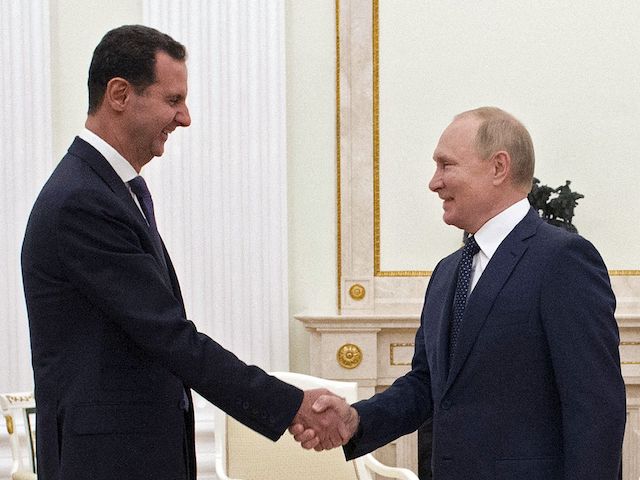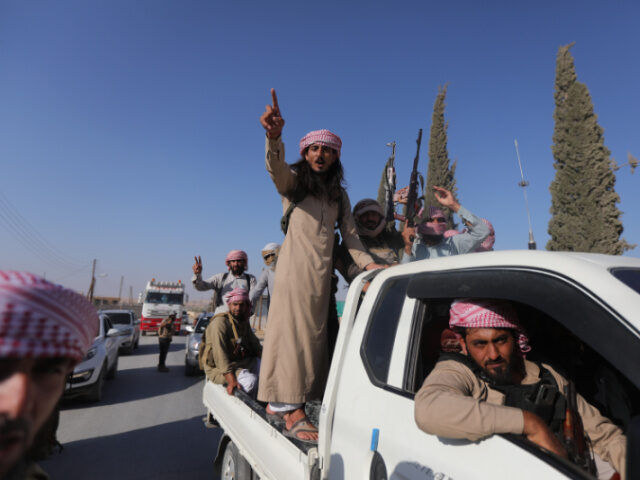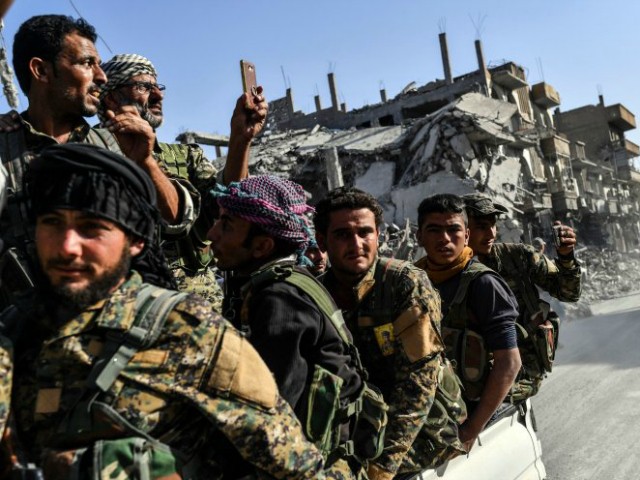A group of senior U.S. officials, including a deputy assistant secretary of state and the commander of the coalition against the Islamic State, visited Syria’s oil-rich Deir al Zor province on Sunday to manage a conflict between its Kurdish rulers and insurgent Arab tribes.
Deir al Zor, located near the border with Iraq, is a strategically vital region largely controlled by the Syrian Democratic Forces (SDF), a Kurdish-led military alliance that opposes the regime of dictator Bashar Assad and fought alongside Western powers against the Islamic State. The SDF has Arab and Christian members, but its dominant power is the People’s Protection Units (YPG), the Kurdish militia.
Residents of northeastern Syria generally line up against the Assad regime and the Islamic State (ISIS), but not all of them are fond of the SDF. Tribal Arabs in the region resent Kurdish dominance and accuse the SDF of mismanaging the region, especially its oil assets.
Last week, the SDF discovered those disgruntled Arab tribes are somewhat more numerous, better organized, and more heavily armed than anticipated. Months of growing unrest erupted into widespread violence after the SDF arrested Ahmed al-Khbeil, an opposition leader better known by his pseudonym, Rashid Abu Khawla.
Abu Khawla was the head of a group called the Deir al Zor Military Council, an Arab militia operating under the authority of the SDF. The SDF detained him, along with four of his top lieutenants, for allegations of drug trafficking and mismanagement.
The SDF further accused Abu Khawla of “communication and coordination with external entities hostile to the revolution,” which likely means Russia, Iran, and/or Turkey. Russia and Iran supported Assad when it seemed like he might lose the Syrian civil war, while Turkey has invaded Syria several times to battle Kurdish terrorists. Turkey’s definition of “Kurdish terrorists” includes almost every armed Kurdish group, including the YPG.

Russian President Vladimir Putin meets with Syrian President Bashar al-Assad at the Kremlin in Moscow on September 13, 2021 (Mikhail Klimentyev/Sputnik/AFP via Getty Images).
The SDF has tried to arrest or expel Abu Khawla on several previous occasions over the past five years, but he was kept in his position with support from the U.S. military, which thought the best way to neutralize the former criminal and Islamic State supporter was to give him a plum job under the SDF hierarchy. U.S. planners have long worried about losing the tribal support Abu Khawla brought to the table or having his supporters turn violently against the SDF, as appears to have been the case last week.
Abu Khawla’s arrest touched off a string of vicious clashes between the SDF and Arab militias, which managed to push the SDF out of several tribal communities. The skirmishes quickly spread beyond the areas that were seen as strongholds of Abu Khawla’s support, with mounting casualties and allegations of abusing civilians leveled against both sides.
On Thursday, an Arab tribal leader named Ibrahim al-Hifl posted an audio message online calling upon all Arab tribesmen to band together against the SDF and other U.S.-backed forces in the region, accusing them of indiscriminately killing civilians.
The SDF and leaders of the Deir al Zor Military Council rejected calls to release Abu Khawla, announced his replacement as head of the Council, and imposed a curfew on the region beginning on Saturday.
Western analysts feared the Assad regime, Turkey, Russia, Iran, and/or jihadi terrorists might exploit the chaos in Deir al Zor. Damascus wasted no time in portraying the SDF as inept “separatists” whose cruelty sparked an uprising.
On Friday, the SDF accused Assad of sending fighters and supplies to support the tribal militants and “cause civil strife that serves their agendas of pressure and threatening the notables of the region.” The SDF urged Deir al Zor residents “not to be drawn into the voices calling for sedition.”
On Sunday, U.S. Deputy Assistant Secretary of State for Syria Ethan Goldrich and anti-ISIS coalition commander Maj. Gen. Joel B. Vowell traveled to Deir al Zor for meetings with Arab tribal leaders and SDF officers. The State Department said their goal was to “address local grievances” and “de-escalate violence as soon as possible.”
That does not appear to be the message the SDF took away from the meeting. On Monday, the SDF expressed appreciation for the “positive” meeting with U.S. officials but said it would continue its operations against the insurgents until a decisive victory is achieved.
The SDF said it is now on the hunt for Ibrahim al-Hifl, identifying him as “head of the strife” and accusing him of working on behalf of malevolent “external parties.”
“Ibrahim and the intruder militants he brought from the west of the Euphrates will no longer be pardoned,” the SDF said, referring to the reinforcement militias allegedly dispatched by Damascus to intensify the conflict.


COMMENTS
Please let us know if you're having issues with commenting.